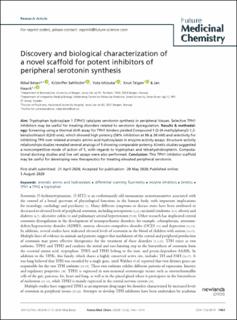Discovery and biological characterization of a novel scaffold for potent inhibitors of peripheral serotonin synthesis
Journal article, Peer reviewed
Published version

Åpne
Permanent lenke
https://hdl.handle.net/11250/2740581Utgivelsesdato
2020Metadata
Vis full innførselSamlinger
- Department of Biomedicine [710]
- Registrations from Cristin [9791]
Sammendrag
Aim: Tryptophan hydroxylase 1 (TPH1) catalyzes serotonin synthesis in peripheral tissues. Selective TPH1 inhibitors may be useful for treating disorders related to serotonin dysregulation. Results & methodology: Screening using a thermal shift assay for TPH1 binders yielded Compound 1 (2-(4-methylphenyl)-1,2-benzisothiazol-3(2H)-one), which showed high potency (50% inhibition at 98 ± 30 nM) and selectivity for inhibiting TPH over related aromatic amino acid hydroxylases in enzyme activity assays. Structure–activity relationships studies revealed several analogs of 1 showing comparable potency. Kinetic studies suggested a noncompetitive mode of action of 1, with regards to tryptophan and tetrahydrobiopterin. Computational docking studies and live cell assays were also performed. Conclusion: This TPH1 inhibitor scaffold may be useful for developing new therapeutics for treating elevated peripheral serotonin.
